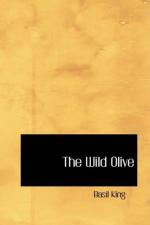Above all, a name seemed required to give him entity. It was a repetition of his feeling about the Wild Olive—the girl in the cabin in the woods. Suddenly he remembered that, if he had found a name for her, she had also found one for him—and that it was written on the steamer ticket in his pocket. He drew it out, and read:
“Herbert Strange.”
He repeated it at first in dull surprise, and then with disapproval. It was not the kind of name he would have chosen. It was odd, noticeable—a name people would remember He would have preferred something commonplace such as might be found for a column or two in any city directory. She had probably got it from a novel—or made it up. Girls did such things. It was a pity, but there was no help for it now. As Herbert Strange he must go on board the steamer, and so he should be called until—
But he was too tired to fix a date for the resumption of his own name or the taking of another. Flinging himself on his couch of moss and trailing ground-spruce, with the ferns closing over him, and the pines over them, he was soon asleep.
Part II
Strange
VII
Dressed in overalls that had once been white, he was superintending the stacking of wool in a long, brick-walled, iron-roofed shed in Buenos Aires when the thought came to him how easy it had all been. He paused for a minute in his work of inspection—standing by an open window, where a whiff of fresh air from off the mud-brown Rio de la Plata relieved the heavy, greasy smell of the piles of unwashed wool—just to review again the past eighteen months. Below him stretched the noisy docks, with their row of electric cranes, as regular as a line of street lamps, loading or unloading a mile of steamers lying broadside on, and flying all flags but the Stars and Stripes. Wines, silk, machinery, textiles were coming out; wheat, cattle, hides, and beef were pouring in. In the confusion of tongues that reached him he could, on occasions, catch the tones of Spaniard, Frenchman, Swede, and Italian, together with all the varieties of English speech from Highland Scotch to Cockney; but none of the intonations of his native land. The comparative rarity of anything American in his city of refuge, while it added to his sense of exile, heightened his feeling of security. It was still another of the happy circumstances that had helped him.
The strain under which he had lived during this year and a half had undoubtedly been great; but he could see now that it had been inward strain—the mental strain of unceasing apprehension, the spiritual strain of the new creature in casting off the old husk, and adapting itself not merely to new surroundings, but to a new life. This had been severe. He was not a rover, and still less an adventurer, in any of the senses attached to that word. His




